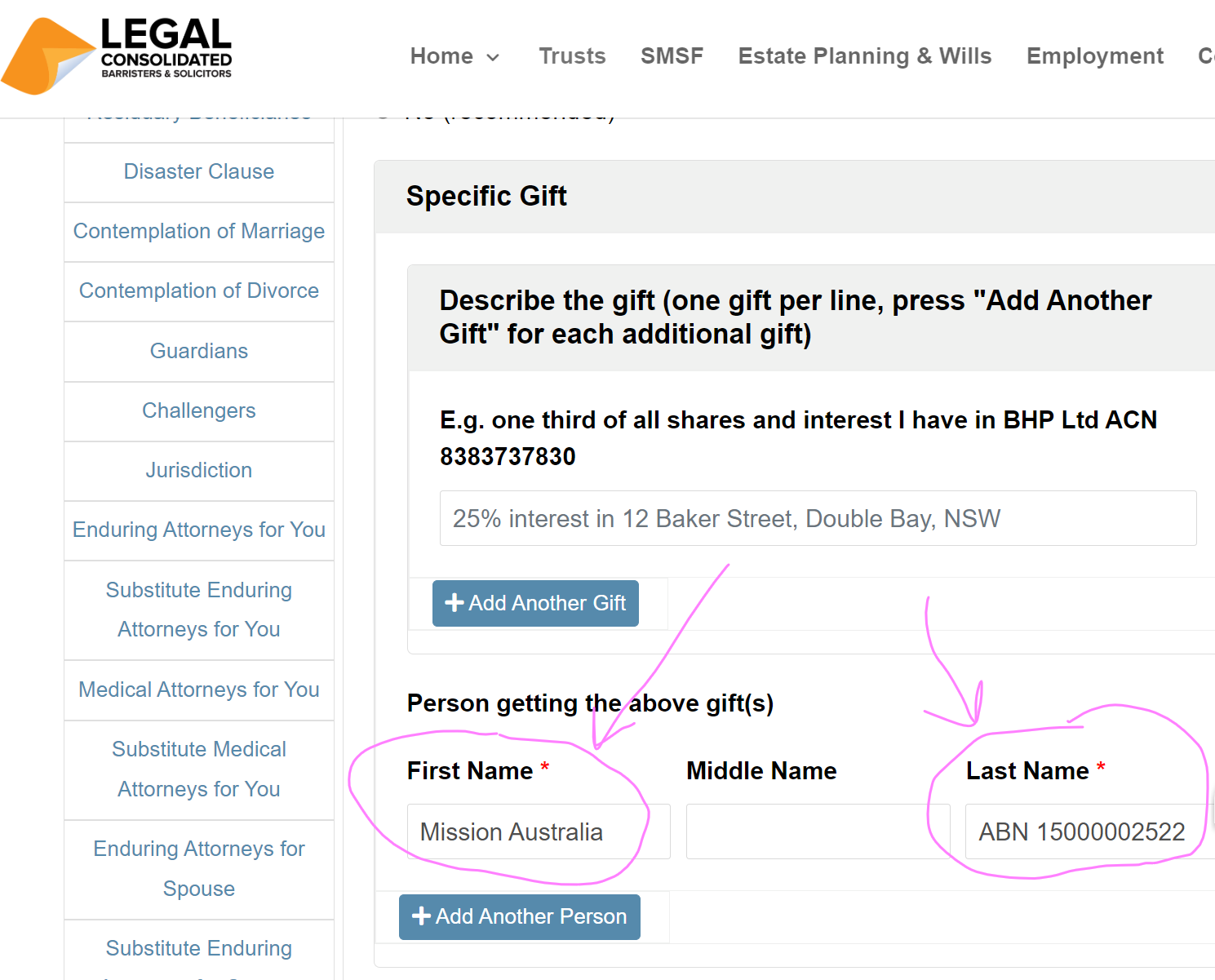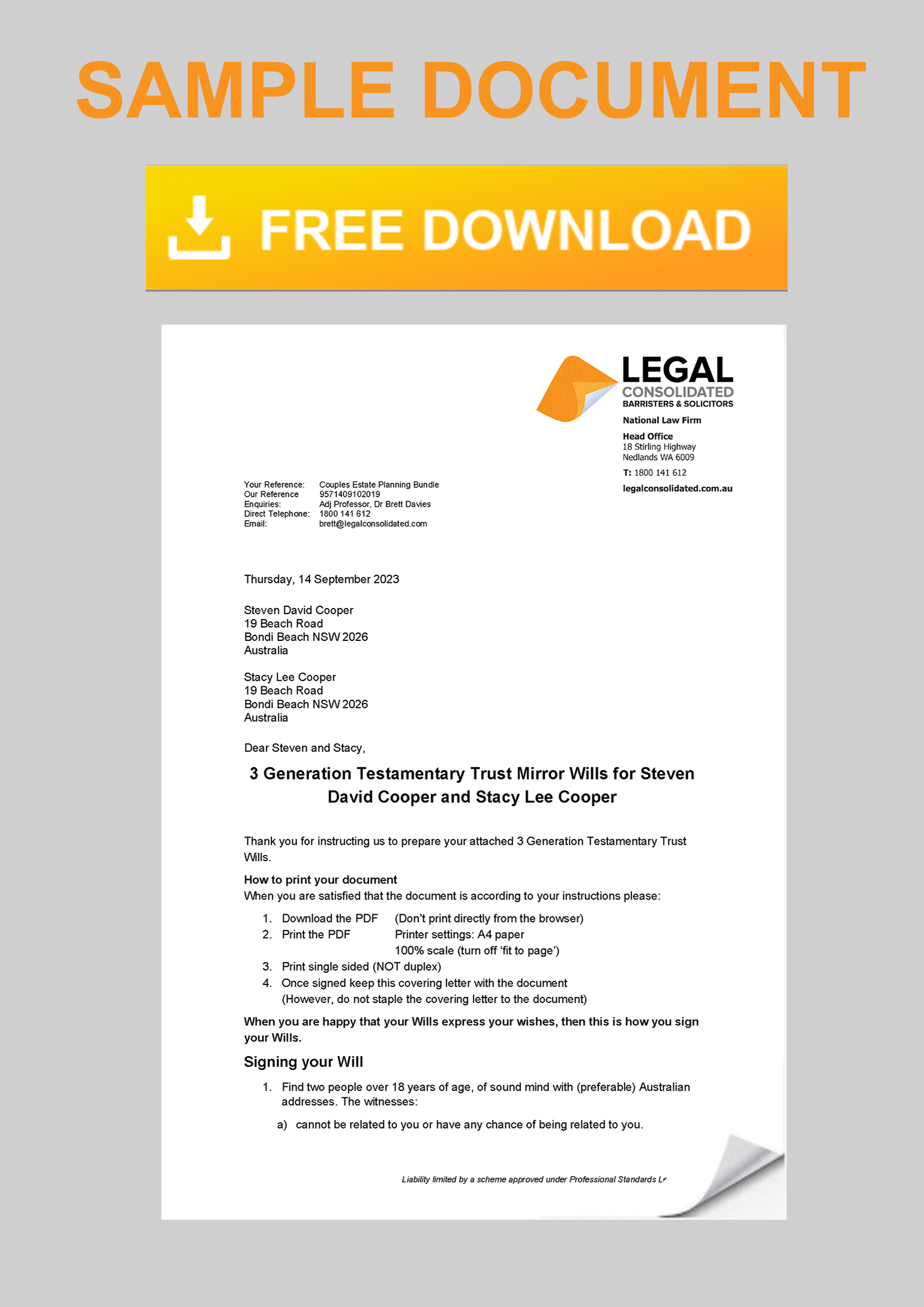
Enduring Power of Attorney
$128 includes GST
-
An NSW Power of Attorney (NSW POA) is a legal document. It allows you to appoint a person to make decisions about your assets. The NSW POA deals with your assets e.g. real estate and bank accounts.
NSW Enduring POA
An NSW Power of Attorney (NSW POA) is a legal document. It allows you to appoint a person to make decisions about your assets. The NSW POA deals with your assets e.g. real estate and bank accounts.
What can’t the NSW POA do?
The New South Wales POA is an “economic” document. Your NSW EPA does not deal with your health treatment or lifestyle. To do this, instead, build a Medical NSW POA on our website. Also, the person receiving your NSW EPA cannot:
* vote in any elections
* make a Will
* sign another NSW EPA
* act as a Trustee
* control your body
However, the person getting your NSW EPA, can open and close bank accounts, pay debts, and buy and sell land. This is provided it is in your ‘best interests’ to do so.
How does the person getting my NSW POA use it?
Here are some examples:
Example 1 – Using your bank account
The persons you appoint walk into the bank and present to the bank clerk with your Savings Account book and an original NSW POA. The bank clerk stares blankly at them.
He sees his bank manager. The bank manager explains to the bank clerk that those persons “now stand in your shoes”. They can do whatever you could do with the bank account. The bank manager asks to take a copy of the NSW EPA for future reference. The bank manager tries to keep the original NSW POA. But your Attorneys (the people you appointed) decline. They get back the NSW POA. The transaction on the bank account takes place.
Example 2 – Signing your legal documents
You tell the persons that you nominated, to sign a lease agreement. You are on holiday overseas and email is unavailable. Your attorney contacts the landlord. They:
1. tell the landlord that there is an NSW Power of Attorney
2. tell the landlord that they are signing the lease on your behalf
3. they sign in their usual signature area and write under the signatures “signed as attorney for *your name* under an NSW EPA dated ## Month, year”.
You are now bound to the lease. The landlord may photocopy the NSW Power of Attorney to attach to the lease.
Six promises by the Attorney in an NSW POA
By law your Attorney in your NSW POA must promise 6 things:
-
Act in your ‘best interests’ at all times
While you are of sound mind this is easy to find out. But when the Principal is of unsound mind this is a huge burden.
The Attorney has to ‘guess’ what is best for you. “Should we sell mum’s family home?” To reduce the chance of attack get your accountant and financial planner to sign off on all big decisions. This is especially if there are taxation, NSW stamp duty, Centrelink and investment consequences.
-
Keep assets separate
The Attorney holds all assets clearly in your name. At any time it must be clear to everyone what assets are the Attorney’s assets. And what assets belong to you as the Principal.
This is not just to stop fraud by the Attorney.
At Legal Consolidated we are often approached to intervene in, ATO, bankruptcy and family court proceedings to show that assets that ‘appear’ to be in the name of the Attorney actually belong to the Principal. The Attorney’s ‘innocence’ in not keeping proper ownership records can lead to the loss of your assets.
-
Keep good records
At any time your family, friends, neighbours and the government can seek access to what the Attorney has been up to. The Attorney must keep reasonable accounts and records of the principal’s money and property.
Your Attorney should take notes or minutes of all activities. There should be a clear chain of activities. The accountant and financial planner should review these records on an annual basis. To do so protects the Attorney.
Even if the Attorney is an only child and the parents are close to death, meticulous records should be kept. At Legal Consolidated we have seen the ATO approach the Attorney after the Principal’s death. This is for a full account of what has been done.
-
Not gain a personal benefit
This is fully considered in detail here. Some POAs may allow small gifts. But the Attorney should not take the bait. The POA is designed for only one purpose. The POA is to protect you, and you alone, as the Principal. If there is any possible way it can be argued that something the Attorney is doing may help the Attorney or their family, then the activity should be signed off by the accountant and financial planner.
The number one cause of negligence and criminal actions against the Attorney is the ‘perception’ or ‘appearance’ that the Attorney has benefited from the POA.
-
Act honestly in the Principal’s legal and financial affairs
This is an additional burden on the Attorney. Not only must the Attorney protect you, as the Principal. But, the Attorney must also act within the laws of Australia. And these can conflict.
Again, cleave to the bosom of your accountant and adviser. And get them to sign off in writing that the Attorney’s action is both in your ‘best interests’ and legal.
-
Not engage in unlicensed financial planning
Many aspects of investments are considered financial planning advice. Only financial planners are licensed to give such advice. There are often financial investment decisions to consider. For example, sell a home, put money in a term deposit or buy shares. The beneficiaries named in the Principal’s Wills, many years later, attacks the Attorney by arguing:
- The Attorney broke the law by engaging in activities that only a licensed financial planner can do.
- The return on investment is only an average of 7% per year from what the Attorney invested in. But the stock market moved 9% per year. We want the upside funded out of the Attorney’s personal wealth.
- The Attorney’s decision to buy a balance share portfolio gave my mum a loss of 5.34% last year. But the Attorney would have received 2% in the Commonwealth Bank Term Deposit. We want the difference from the Attorney personally.
These attacks are mitigated if the Attorney receives prior written ‘sign off’ from the financial planner.
Can the Attorney go to jail if they abuse the NSW economic Enduring Power of Attorney?
Yes. if your attorney abuses the power given to them through an Economic Enduring Power of Attorney (EPA) in New South Wales, they face legal consequences.
The Attorney is liable for any financial losses suffered by the person they were acting on behalf of.
The Attorney may also face criminal charges if they are found to have engaged in fraudulent or illegal activity. In serious cases, the attorney may face imprisonment. If you suspect that an attorney has abused their power under an EPA it should be reported to the Police.
Examples of financial abuse of an NSW POA
If your Attorney is found to have abused their power under a Power of Attorney (POA) they are sued for any financial losses suffered by the person they were acting on behalf of. That is you the Principal.
For example, if your Attorney uses the POA to sell your property or assets for less than fair market value, the person can sue the Attorney for the difference in value.
If an Attorney uses the POA to transfer money from the person’s bank account into their own account, the person can sue the Attorney for the amount of money that was transferred.
Additionally, if the attorney is found to have engaged in fraudulent or illegal activity, they face criminal charges and civil actions. The Attorney is held liable for any financial damages that you incurred. This is as a result of the Attorney’s actions. Often we have found that the Attorney is ordered to pay compensation to the person they acted on behalf of.
Further, the Attorney may also be liable to repay any costs of the legal proceedings.
Protects from death duties, divorcing and bankrupt children and a 32% tax on super. Build online with free lifetime updates:
Couples Bundle
includes 3-Generation Testamentary Trust Wills and 4 POAs
Singles Bundle
includes 3-Generation Testamentary Trust Will and 2 POAs
Death Taxes
- Australia’s four death duties
- 32% tax on superannuation to children
- Selling a dead person’s home tax-free
- HECs debt at death
- CGT on dead wife’s wedding ring
- Extra tax on Charities
Vulnerable children and spend-thrifts
- Your Will includes:
- Divorce Protection Trust if children divorce
- Bankruptcy Trusts
- Special Disability Trust (free vulnerable children in Wills Training Video)

- Guardians for under 18-year-old children
- Considered person clause to stop Will challenges
Second Marriages & Challenging Will
- Contractual Will Agreement for second marriages
- Wills for blended families
- Do Marriages and Divorce revoke my Will?
- Can my lover challenge my Will?
- Make my Will fair: hotchpot clauses v Equalisation?
What if I:
- have assets or beneficiaries overseas?

- lack mental capacity to sign my Will?
- sign my Will in hospital or isolating?
- lose my Will or my home burns down?
- have addresses changed in my Will?
- have nicknames and alias names?
- want free storage of my Wills and POAs?
- put Specific Gifts in Wills
- build my parent’s Wills?
- leave money to my pets?
- want my adviser or accountant to build the Will for me?
Assets not in your Will
- Joint tenancy assets and the family home
- Loans to children, parents or company
- Gifts and forgiving a debt before you die
- Who controls my Company at death?
- Family Trusts:
- Changing control with Backup Appointors
- losing Centrelink and winding up Family Trust
- Does my Family Trust go in my Will?
Power of Attorney
 Money POAs: NSW, VIC, QLD, WA, SA, TAS, ACT & NT
Money POAs: NSW, VIC, QLD, WA, SA, TAS, ACT & NT
- be used to steal my money?
- act as trustee of my trust?
- change my Superannuation binding nomination?
- be witnessed by my financial planner witness?
- be signed if I lack mental capacity?
- Medical, Lifestyle, Guardianships, and Care Directives:
- Company POA when directors go missing, insane or die
After death
- Free Wish List to be kept with your Will
- Burial arrangements
- How to amend a Testamentary Trust after you die
- What happens to mortgages when I die?
- Family Court looks at dead Dad’s Will


